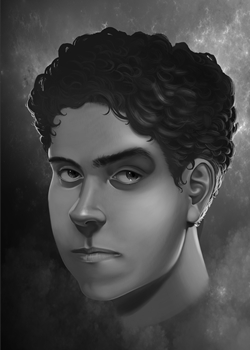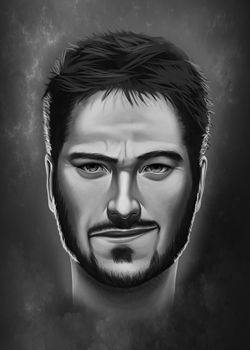Gwen Perkins, author of the swords-and-sorcery fantasy The Universal Mirror, discusses her novel's characters, magic system, and inspirations. Visit her website, Friend her on Facebook, or Follow her on Twitter.
The Universal Mirror takes place on the island of Cercia, where magic is strictly bound by laws called the Heresies. What inspired you to set up your world in this way?
One of the
things that I've always found inspiring as a writer is limitations. I've never been someone who is very good at
thinking up plots with perfect characters.
If someone can accomplish what they need easily and with little resistance
from the outside world, I'm afraid that I just don't find that incredibly
believable, perhaps because that doesn't reflect my own experience.
The
Heresies came about for a number of reasons.
The world of Cercia is a place in which structured religion as we
understand it has been gone for some time.
One of the themes that I wanted to examine in this series, however, was
the question of what laws do men live by when they have no gods? In this case, the Cercians replaced
formalized religion with a set of laws and prohibitions around magic with the
idea of keeping public order. (There are more sinister reasons for why they did
this but I'd prefer not to spoil anyone for further twists in the series.) Each "Heresy" basically relates to
something that the government doesn't wish the people to do, particularly those
who have access to controlling great amounts of physical power.
A key
question in the novel becomes why the government makes one of these laws in
such a way that no magician is allowed to heal.
It makes no sense to the protagonists that their moral code outlaws what,
to them, is one of the most moral actions a man can take.
 |
| Quentin |
Both the arrogant young nobleman Quentin and his best friend, the
good-hearted merchant Asahel, could be considered the protagonist. Why did you
choose to focus on two main characters instead of one?
I like to do two main characters per novel because it allows
me to change the focus and to cover more ground. Each character brings something very
different to the table and it's interesting to me how readers have reacted to
both.
 |
| Asahel |
Do you have a favorite character, or a character you particularly
sympathize with?
I have to admit that I love them all in different ways,
though Quentin irritated me quite a lot in the writing of the first book. I'm fond of Asahel in large part because of
how I see him changing and growing throughout the series (a bit spoilery,
perhaps, but true).
A character that I was surprised to discover I enjoyed as
much as I did was Felix. Felix was
actually introduced into the book because my youngest daughter asked me to name
a character Felix. I did so to humor her
and then got really interested in his story.
I had a number of readers comment on him as well, so many that it
actually got him promoted to main character status in the second book. (I have to admit, I'm one of those authors
who listens to their readers. I may not
always be able to make them happy but in a case like this, it was a pleasure to
try. Hopefully, I've succeeded.)
Which part of The Universal Mirror did you most enjoy writing
and why?
It's always a little easier for me to remember the hard
parts but there were definitely characters and moments that I enjoyed. There are a few little references and injokes
that I slipped in here and there (one reader finally caught one to Sweeney Todd
the other day and I was so happy)—I love to put those things in since it gives
people who know something about me or about history something to uncover.
It's hard for me to share my favorite scenes without
spoiling the entire book but I really loved writing the end of the story. By that point, the character relationships
were defined enough that I was able to keep building on them. For the same reason, I enjoyed the
sequel—familiar characters allowed me to delve more deeply into the story at
hand.
One of the things that jumped out to me about your writing is how it
carries an old-fashioned, almost archaic tone, reminiscent of older fantasies
and even epic poems. Why did you choose to write in this style?
I don't know that it was entirely intentional so much as a
carryover from my day job. I work as a
museum curator and spend a lot of time reading letters and documents from the
past. When you spend most of your days
thinking in that voice, it slips into just about everything you write. For this story, it felt appropriate enough to
keep.
I also cut my teeth as a child on the old sword and sorcery
tales so you're right in noting that influence.
I loved those short, simple books that people like Fritz Leiber and
Robert Howard were writing—they were always so full of magic, mystery and
intrigue. That was the feel I wanted to
capture in these fantasy stories of my own—just to give the reader a few
moments of adventure away from their own lives.
How did you develop the magic system at the center of the story? That
is, the rules of the magic, how it is used and channeled, who can use it, etc.?
The rules and ideas actually were inspired initially by the
Renaissance university and education system.
I tend to think of the education that the magicians receive as much more
global than a simple expression of magic (I'm working on a prequel, Paper Armor, that really defines the use
of magic in Cercia).
Also, one thing that I knew was that I wanted a kind of
magic that could be channeled through a universal resource but that I could
have different cultures use in different ways.
That was where the use of the body as a conduit for earth energies came
in. I could write a whole post just on
that concept and the differing relationships of cultures in the Artifacts-verse
to magic—it definitely comes into play in The
Jealousy Glass and more so in subsequent novels.
In The Universal Mirror, you take the time to set up your world
before advancing the plot and conflict. Why did you choose to write with this
slower pace rather than the page-turning style that seems to be in vogue these
days?
To me, what was important was setting the foundation for a
much broader story. The series travels
throughout a number of lands and examines the magicians' interactions with
class, other cultures and with their own abilities. It's hard to tell stories like that unless
you start with a strong base. I'm hoping
that readers will want to stay with the series through its end and that, by
allowing them to know the world and characters, they will love them as much as
I do and perhaps imagine themselves a part of it.
If you were to live on the island of Cercia, who would you be?
Magician? Noblewoman? Both? What do you think it would be like to live there?
Oh, I'd probably be a poor wretch on the docks!
As far as what it would be like to live in Cercia, it would
all depend on who you were and what your class was. (And don't forget questions of gender,
sexuality, and to some extent, religion.)
I imagine that being a noble in Cercia would be a fairly relaxed and
pampered existence, if a little boring, whereas those of the lower classes have it extremely
hard. Women also struggle in Cercia and
have a much more difficult existence there than in the Anjduri Empire or other
parts of the world. There's a history
behind that but that will be saved for other books.
What’s next for Quentin and Asahel?
They're both featured in the sequel to Universal Mirror entitled The
Jealousy Glass. This book, which
comes out December 1, follows Asahel as he travels to the Anjduri Empire with
Felix in tow. It takes place one year
after the events at the end of the first book and really starts to examine how
things have unfolded in Cercia since.
Really, it's like a friend of mine put it—"The revolution's
over. Now what?"
The Universal Mirror is available at: Amazon US (Kindle e-book), Amazon US (paperback), Amazon UK (Kindle e-book), Amazon UK (paperback), Barnes & Noble (paperback), Powell's Books (paperback)
The Universal Mirror is available at: Amazon US (Kindle e-book), Amazon US (paperback), Amazon UK (Kindle e-book), Amazon UK (paperback), Barnes & Noble (paperback), Powell's Books (paperback)





No comments:
Post a Comment